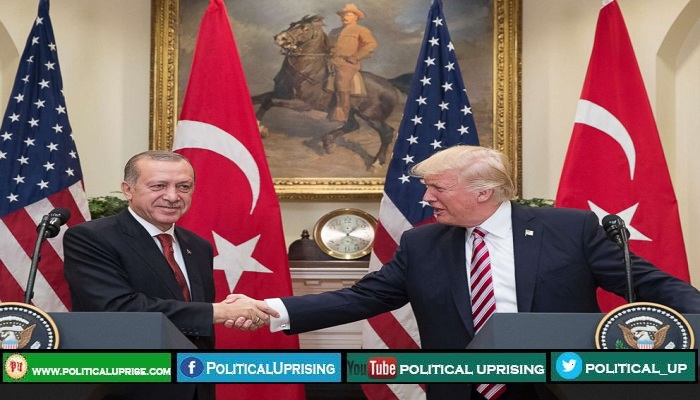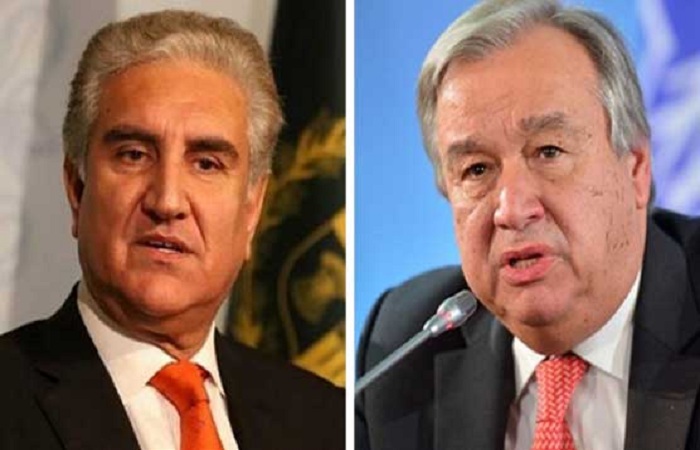US Congress is planning for possible economic sanctions on Turkey as White House seeks to manage friction with a NATO ally.
When Turkish President Recep Tayyip Erdogan visits the White House ,he will likely receive a relatively warm,but conflicted, reception from President Donald Trump, but a hostile one from members of the United States Congress.
The visit comes just a month after Turkey launched a military offensive against Kurdish YPG forces in northeast Syria.
YPG is viewed by Turkey as an offshoot of the armed Kurdistan Workers’ Party (PKK), considered by Ankara and several Western nations a “terrorist” organisation whose campaign for autonomy has killed tens of thousands over the past decades.
Read More: Brexit party leader ask for change in Brexit deal
The operation came following an agreement between Erdogan and Trump, after which the US president announced he was withdrawing troops from the area.
The withdrawal angered US Democrats and Republicans who saw the move as an abandonment of the Kurds, who had been one of the US’s main allies in the fight against the Islamic State of Iraq and the Levant (ISIL or ISIS).
Sinan Ulgen, a Turkish analyst and former diplomat, said Erdogan would try to “convince Trump to fulfill its promises in Syria and abandon its relationship with the YPG”.
Ankara says the YPG has not withdrawn from all areas agreed upon in the US-Turkey deal signed last month.
Erdogan also recently expressed his frustration over joint US-YPG patrols in northern Syria.
“Trump seems to be Turkey’s only friend in the US, as the Congress and some senior officials in the US administration have been taking actions or trying to take actions against Ankara,” Ulgen said.
Read More: Instagram to do certain changes
“Ankara did not expect such a harsh public and political reaction from the US, and from other Western allies, against its operation in Syria, particularly about an issue the government believes it is right,” he added.
Although the operation has since ended with the Kurdish YPG forced to withdraw from some of the Syria-Turkey border regions, analysts say the political backlash in the US continues to simmer, limiting the US president options when it comes to Turkey and putting into doubt the long-term future of the already fraught relationship between the two countries.
“This is one of the lowest points in the historical US-Turkey relationship,” said Fawaz Gerges, a professor of international relations at the London School of Economics.
“It’s no wonder why Russia’s [Vladimir] Putin has been establishing a close partnership with Erdogan at the cost of Turkey’s strategic membership in NATO,” Gerges said.
Referring to Turkey’s dealings with Russia, including Ankara’s purchase of the Russian S-400 defence system and Moscow’s growing influence in Syria.
Aaron David Miller, a senior fellow at the Carnegie Endowment for International Peace, agreed, saying “the problem is that for decades [the US] loaded a whole lot freight on the relationship” with Turkey.
Read More: US columnist sues Trump for calling her liar
“With the end of the Cold War, the common interests which bound [the US and Turkey] together which were basically driven by the historic Turkish fear and American Cold War with the Russians, the former Soviet Union, came to an end,” Miller Said.
“As a consequence of that ending, problems began to emerge which were much less easily managed.”
Today, a significant irritant in the US-Turkey relationship is Erdogan’s decision to buy S-400 missile defence systems from Russia.
The US responded by suspending Turkey from the F-35 advanced fighter jet programme earlier this year, but has so far stopped short of implementing punishing sanctions over the move.
Read More: Trump news: US House approves resolution
Senior Trump administration officials told reporters at the White House on Tuesday that the president is committed to direct engagement with Erdogan and “full and frank” discussions on Syria and the S-400 purchases.
Trump plans to discuss Turkey’s purchase of the S-400 defence system from Russia, the officials said.
Robert O’Brien, the US president’s national security adviser, said on Sunday that Trump will warn Erdogan that Turkey could still face US economic sanctions over the S-400 purchases.
US Congress prepares to impose new Economic sanctions on Turkey.



